To determine if you need to put money down to lease a car, start by evaluating your credit score. A higher score often allows you to negotiate terms without a down payment. Next, review the lease agreement; some dealers may offer zero-down options or incentives. Consider your financial situation—will a larger down payment lower monthly payments and improve cash flow? Weigh the risks, like losing your down payment if the car is totaled. Exploring various leasing options can help you find the best fit for your budget. There's more to uncover that can help you make informed leasing decisions.
Key Takeaways
- Assess your credit score, as higher scores may allow you to lease without a down payment.
- Evaluate your monthly budget to determine if you can afford higher payments without a down payment.
- Research dealer promotions or incentives that may offer zero-down lease options.
- Consider applying the trade-in value of your current vehicle toward the lease to avoid upfront costs.
- Analyze your financial situation to weigh the benefits and risks of making a down payment.
Understanding Lease Payments
When you lease a car, understanding how lease payments are calculated can save you money and stress. Your monthly payments are primarily based on the vehicle's selling price and its residual value. Fundamentally, the lower the selling price or the higher the residual value, the less you'll pay each month. This formula directly affects your total cost over the lease term, so it's important to keep these figures in mind.
Another important factor is the money factor, which represents the interest rate on your lease. A lower money factor means you'll incur minimal interest charges, further reducing your overall expenses.
When negotiating, it's smart to request two lease quotes—one with a down payment and one without. This allows you to see the cost differences clearly and helps evaluate what you can afford.
While a down payment isn't always required, especially for those with good credit, it can lower your monthly payments. Just remember to account for additional fees like acquisition fees and security deposits, which can impact your upfront expenses.
Understanding these elements can empower you to make informed decisions while leasing your next vehicle.
Importance of Down Payments
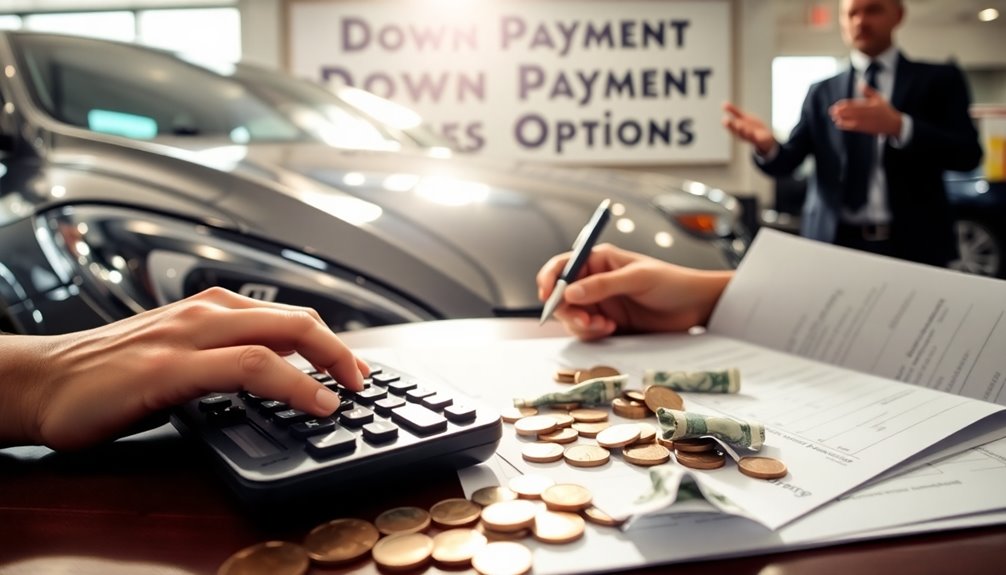
When you consider making a down payment on a car lease, you can lower your monthly payments and reduce the total interest paid over the lease term. However, putting down a large sum carries risks, like losing that money if the vehicle is stolen or totaled. It's important to weigh the benefits against the potential pitfalls to determine what's right for your financial situation. Additionally, understanding the residual value of the vehicle can help you make a more informed decision about your down payment.
Benefits of Down Payments
Understanding the benefits of making a down payment can greatly impact your leasing experience. A down payment can help you achieve a more affordable and manageable lease. Here are some key advantages:
- Lower Monthly Lease Payments: A down payment reduces the amount financed through the lease, resulting in lower monthly payments.
- Reduced Overall Cost: Typically, a recommended down payment is around 20% of the vehicle's value. This can greatly decrease the total interest paid throughout the lease term.
- Financial Protection: If you need to terminate the lease early, a larger down payment minimizes penalties and extra charges, providing you with added security.
- Enhanced Affordability: By lowering the financed depreciation amount, a substantial down payment results in lower monthly costs, making the lease more budget-friendly.
When lease terms are good, and you make a down payment, you're setting yourself up for success. Additionally, it's important to consider how a retirement savings plan can improve your overall financial health, allowing you to manage your cash flow better.
While a high down payment can be beneficial, remember that a lower down payment can also preserve your cash flow for other expenses or investments.
Risks of Down Payments
While a down payment can offer several advantages for leasing a vehicle, it's important to be aware of the potential risks involved. One significant risk is the potential for financial loss. If your leased vehicle is stolen or totaled, gap insurance typically only covers the outstanding lease amount, leaving you at a loss for your down payment.
Another consideration is the nonrefundable nature of down payments. If you need to terminate your lease early or face a total loss of the vehicle, you may lose your initial investment entirely.
Although a down payment can lower your monthly lease payments, it doesn't reduce the total amount of the lease; the capitalized cost remains unchanged regardless of how much you put down.
Financial Implications of Down Payments
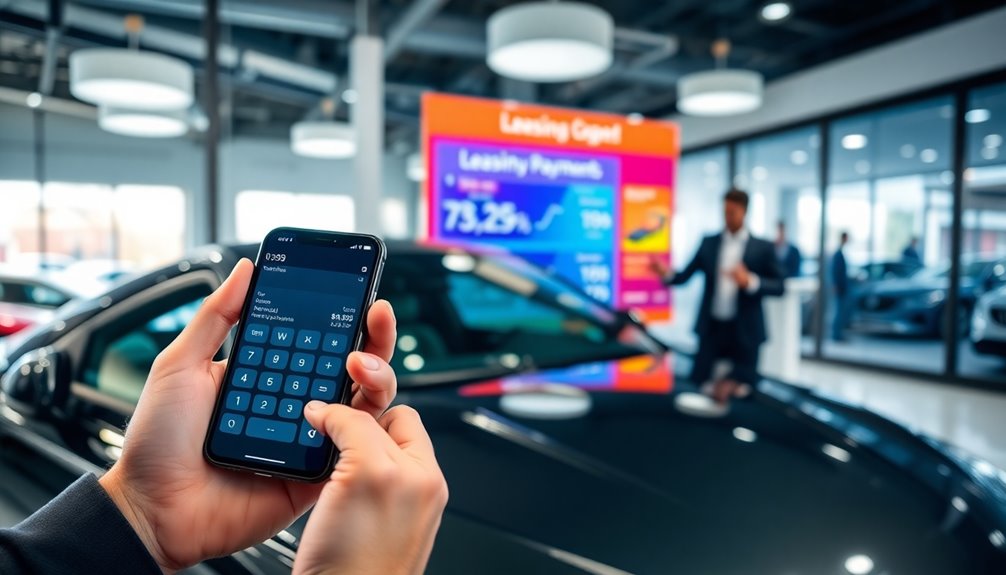
Reflecting on the financial implications of down payments is essential when leasing a car. While you might think a larger down payment reduces monthly payments, it doesn't greatly decrease overall lease costs since the total amount financed remains unchanged.
Here are some key factors to reflect on:
- Zero-down options: Many leasing agreements don't require a down payment, especially for those with a good credit score. This can help preserve your cash flow.
- Assessing financial risk: If the vehicle is totaled or stolen, a large down payment is at risk, as gap insurance usually covers only the lease payoff amount.
- Alternative uses of funds: Reflect on using the money you'd put down to pay off higher-interest debts instead, which could offer better financial benefits.
- Monthly payments vs. total costs: A larger down payment might lower your monthly payments, but evaluate whether the overall lease costs justify the upfront cash.
Situations Favoring Large Down Payments
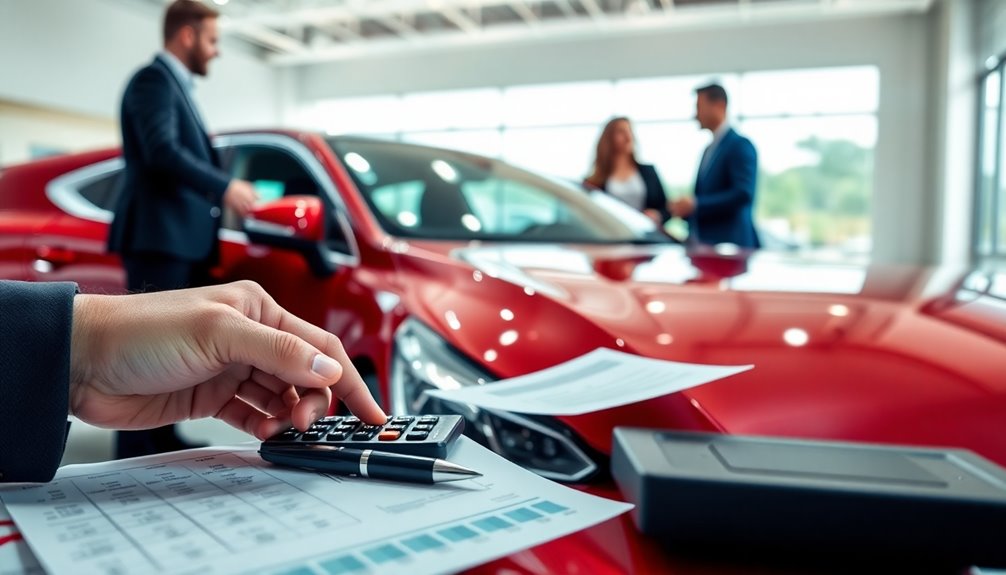
When you're considering leasing a car, a large down payment can really work in your favor, especially for high-priced vehicles.
It can considerably lower your monthly payments and might even unfasten special lease incentives that make the deal more appealing.
Plus, putting more money down upfront can help you manage overall costs effectively. Additionally, a larger down payment can improve your chances of securing favorable lease terms, especially if you have bad credit.
High Selling Price Impact
Often, a high selling price for a vehicle makes a larger down payment a smart choice. By putting more money down upfront, you can considerably reduce your lease cost and monthly payments.
Here are four reasons why a larger down payment can benefit you:
- Lower Financed Amount: A larger down payment decreases the financed amount, which means less interest to pay over the lease term.
- Mitigates Higher Money Factor: When leasing a vehicle at a high selling price, a larger down payment can help offset a higher money factor, minimizing overall costs.
- Prevents Negative Equity: By making a substantial down payment, you protect yourself from negative equity, especially if the vehicle's value depreciates faster than expected.
- Reduces Financial Loss Risk: Should the vehicle be totaled or stolen, a larger upfront payment can cushion potential financial loss, as you'd owe less than the car's worth. Additionally, a larger down payment can lead to lower monthly payments, making it easier to manage your budget over time.
Special Lease Incentives
Leveraging special lease incentives can greatly enhance your leasing experience, especially when opting for a larger down payment. Manufacturers and dealerships often provide these incentives to promote specific models or clear out inventory, making it worthwhile to evaluate them.
When faced with high selling prices and special low money factors, putting down a larger down payment can justify lower monthly payments, which is particularly appealing for budget-conscious lessees.
By making a significant upfront investment, you may access favorable lease terms, such as reduced interest rates or more attractive monthly payment structures. However, it's important to assess your individual financial situation, including your credit score and current debt levels, to determine if a larger down payment aligns with your goals.
Don't forget to compare total lease costs with and without a down payment. This assessment will help you see if that upfront cash investment leads to notable long-term savings.
Ultimately, understanding special lease incentives can empower you to make smarter financial choices and enhance your overall leasing experience.
Lower Monthly Payment Benefits
A larger down payment can greatly lower your monthly lease payments, making it an appealing option for many lessees. By reducing the financed amount, you can markedly decrease your monthly obligations throughout the lease term.
Here are some key benefits of making a larger down payment:
- Lower Monthly Payments: Increasing your down payment can reduce your monthly lease payments by $30 to $50, depending on the vehicle's price and lease terms.
- Better Interest Rate: A substantial down payment may help you secure a better interest rate, leading to even lower lease costs.
- Enhanced Cash Flow: Lower monthly payments can improve your cash flow, allowing you to budget more effectively for other expenses or investments.
- Favorable Lease Terms: A larger down payment can lead to better lease terms and conditions, making leasing a car a more financially sound decision.
In situations where high selling prices and money factors are involved, opting for a larger down payment can truly reduce your monthly obligations and create a more favorable financial arrangement over the lease duration.
Components of Lease Payments
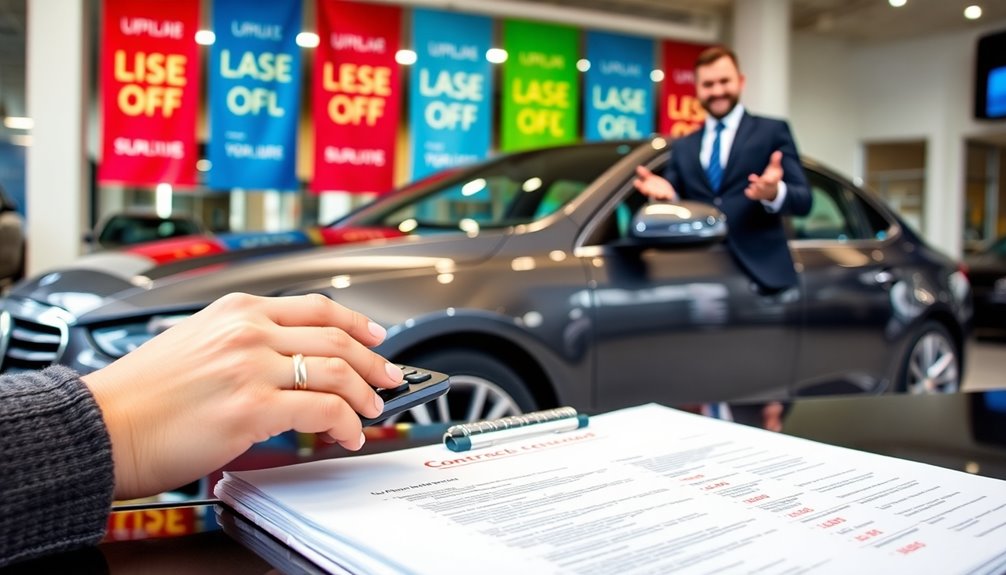
When leasing a car, understanding the components of lease payments is vital for managing your budget effectively. Lease payments are primarily calculated based on the vehicle's selling price minus its residual value, which is the estimated worth at the end of the lease term.
The payment amount you'll face each month can fluctuate considerably depending on your down payment. For instance, making a $1,999 down payment could reduce your total lease cost to $9,970, whereas opting for a zero-down lease would increase your overall amount.
Interest charges also play an important role. A lower money factor means reduced interest, which directly impacts your monthly payment.
Additionally, don't forget about the various additional fees, like acquisition and inception fees, which are included in the total lease payment calculation. These fees can considerably affect your initial costs at signing and your overall leasing costs.
Risks of Large Down Payments
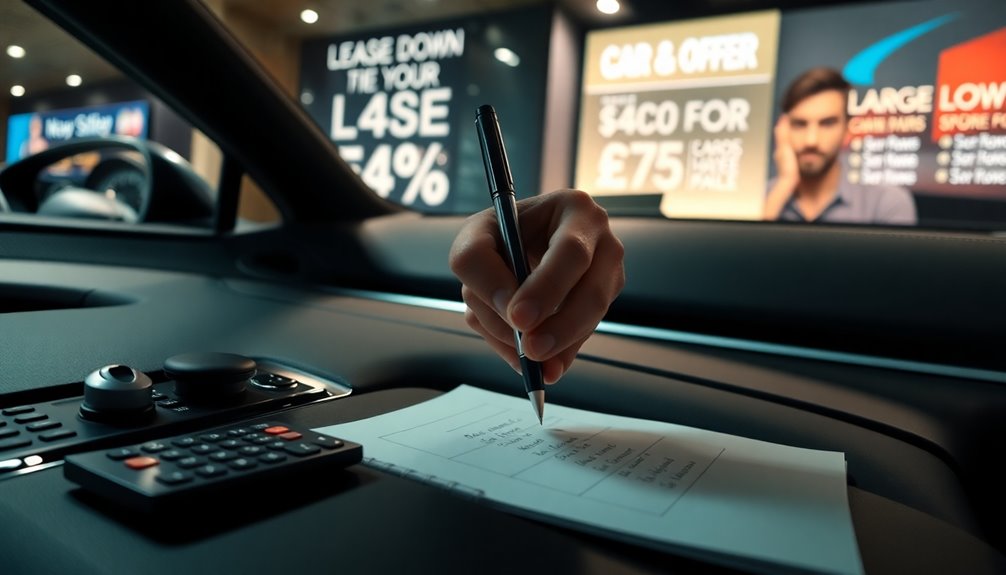
Understanding the components of lease payments lays the groundwork for recognizing the risks associated with large down payments. While a substantial upfront payment, known as a capitalized cost reduction, might seem appealing, it comes with significant drawbacks.
Here are four key risks to weigh:
- Financial Loss: If your leased vehicle is stolen or totaled, you typically lose your down payment since insurance payouts rarely cover that upfront cash.
- Irrecoverable Payments: Large down payments are usually non-refundable. If you terminate the lease early, you can't recover those funds.
- Cash Flow Constraints: A high down payment may lower your monthly payments, but it can also limit your cash flow for other essential expenses or investments.
- No Guarantee of Savings: Despite the initial allure of reduced monthly payments, the total lease cost remains unchanged, meaning you mightn't save as much as you think.
Before committing to a large down payment, evaluate your personal financial situation carefully.
Weighing these risks against potential benefits will help you make a more informed decision on your leasing options.
Alternatives to Down Payments
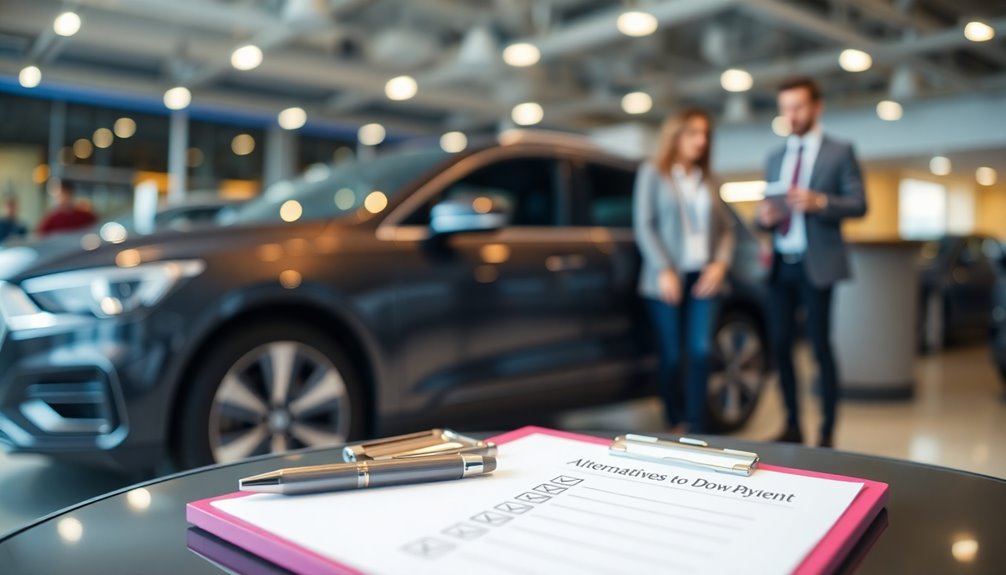
Exploring alternatives to down payments can open up more flexible leasing options that suit your financial needs. Many leasing companies offer zero-down payment options, making it easier for you to finance a vehicle without any upfront cost, especially if you have good credit.
Instead of a down payment, you can negotiate lower monthly payments through favorable lease terms or incentives from the dealership.
Another option to contemplate is using the trade-in value of your existing vehicle. This can be applied toward the lease, allowing you to avoid a cash down payment altogether.
If you're worried about cash flow, opting for a higher monthly payment rather than a significant down payment helps preserve your liquidity for other expenses or investments.
It's also wise to look into GAP insurance if you choose not to put money down. This coverage protects you by covering the difference between the lease payoff and the vehicle's value in case of theft or total loss. Additionally, consider the potential benefits of leveraging your investment strategy, such as diversification of your portfolio, which can provide a safety net for your financial decisions.
Evaluating Your Financial Situation
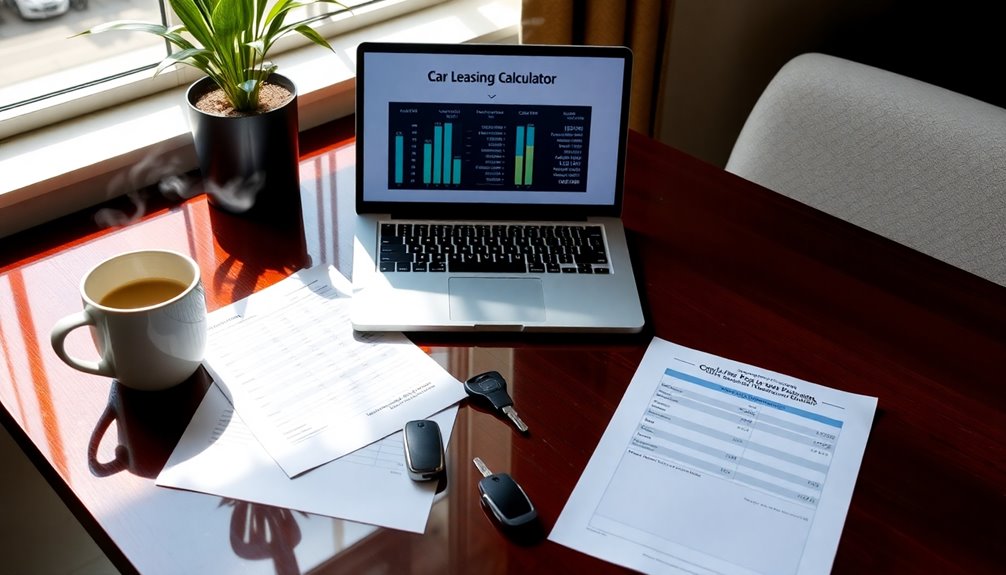
Before diving into a car lease, it's crucial to assess your financial situation to make informed decisions. Evaluating your finances will help you determine whether a down payment is necessary and how it impacts your overall financial health.
Here are four key aspects to take into account:
- Credit Score: Check your credit score. A higher score often allows lease approval without a down payment, while a lower score may require one to secure better terms.
- Monthly Budget: Calculate your monthly budget. This will help you figure out how much you can afford for lease payments, influencing whether a down payment is feasible.
- Financial Obligations: Analyze your current financial obligations, like debts and other payments. Verify that setting aside funds for a down payment aligns with your cash flow and financial goals.
- Leasing Options: Research various leasing options and promotions. Some dealerships may offer special deals that don't require a down payment, providing you with more flexibility.
Consulting Leasing Professionals
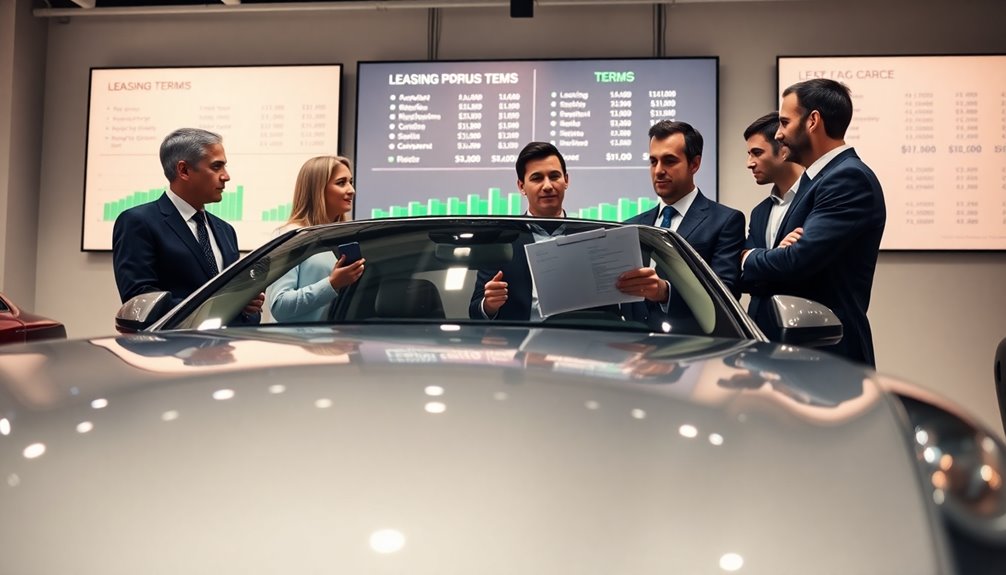
After evaluating your financial situation, it's time to contemplate consulting leasing professionals. These experts can help you navigate current market trends and determine whether a down payment is necessary based on the vehicle's selling price and your credit score. They can also assess if a larger down payment would reduce your monthly payments or if a zero-down lease is a better fit.
Engaging with leasing professionals allows you to compare multiple lease offers, making it easier to find the most financially advantageous option. Additionally, they often have access to special incentives that may enable you to lease a car without a down payment. It's essential to understand the implications of your decision, including potential risks related to non-refundable amounts in case of theft or total loss.
| Down Payment Option | Monthly Payments |
|---|---|
| Larger Down Payment | Lower Monthly Payments |
| Zero-Down Lease | Higher Monthly Payments |
Frequently Asked Questions
How Much Money Should You Put Down on a Leased Car?
When deciding how much money to put down on a leased car, consider your budget and financial goals.
A down payment around 20% can lower your monthly payments and overall lease cost. However, if you'd prefer to keep more cash on hand for other expenses, a smaller down payment might be better.
Also, check your credit score; a strong score can help secure a lease without a hefty down payment.
Choose what works best for you!
What Is the 1 Rule in Car Leasing?
When leasing a car, there's one essential rule you can't ignore: avoid making a down payment.
You might think putting money down is helpful, but it often offers little benefit. Imagine losing that cash if the car's stolen or totaled!
Instead, focus on finding leases with zero-down options. Keeping your cash reserves can be smarter, letting you invest in other opportunities while enjoying the benefits of a new vehicle without unnecessary upfront costs.
Is It Better to Lease a Car With No Money Down?
Leasing a car with no money down can be a smart choice for you, especially if you wanna keep more cash for other expenses.
While you might face higher monthly payments, the overall cost of the lease doesn't change much.
Just keep in mind that you'll still have upfront costs like the first month's payment and fees.
It's essential to weigh your financial situation and long-term goals before making a decision.
Why Do I Have to Put Money Down on a Lease?
You might wonder why you have to put money down on a lease when some options seem available without it. A down payment can lower your monthly payments and secure better terms, especially if you've got a lower credit score.
It gives the leasing company peace of mind. However, remember that any money down isn't refundable.
Weigh the benefits against the risks before deciding what works best for you.
Conclusion
In the grand journey of leasing a car, knowing whether to put money down can be a game changer. Think of it as a balancing act, where you weigh your options and financial landscape. While a little down can ease your monthly payments, going all-in might not always be the best route. Remember, it's all about finding what fits your lifestyle. So, take a moment to reflect and consult the experts, and you'll steer yourself in the right direction.










